formerly eScholarship Editions


|
|
|
|
Your request for similar items found 20 book(s). | Modify Search | Displaying 1 - 20 of 20 book(s) | |
| 1. | 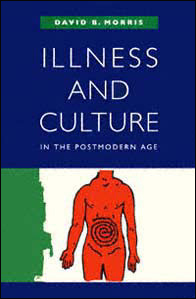 | Title: Illness and culture in the postmodern age Author: Morris, David B Published: University of California Press, 1998 Subjects: Sociology | Philosophy | Medicine | Technology and Society | Anthropology | American Studies Publisher's Description: We become ill in ways our parents and grandparents did not, with diseases unheard of and treatments undreamed of by them. Illness has changed in the postmodern era - roughly the period since World War II - as dramatically as technology, transportation, and the texture of everyday life. Exploring these changes, David B. Morris tells the fascinating story, or stories, of what goes into making the postmodern experience of illness different, perhaps unique. Even as he decries the overuse and misuse of the term "postmodern," Morris shows how brightly ideas of illness, health, and postmodernism illuminate one another in late-twentieth-century culture.Modern medicine traditionally separates disease - an objectively verified disorder - from illness - a patient's subjective experience. Postmodern medicine, Morris says, can make no such clean distinction; instead, it demands a biocultural model, situating illness at the crossroads of biology and culture. Maladies such as chronic fatigue syndrome and post-traumatic stress disorder signal our awareness that there are biocultural ways of being sick.The biocultural vision of illness not only blurs old boundaries but also offers a new and infinitely promising arena for investigating both biology and culture. In many ways Illness and Culture in the Postmodern Age leads us to understand our experience of the world differently. [brief] Similar Items |
| 2. | 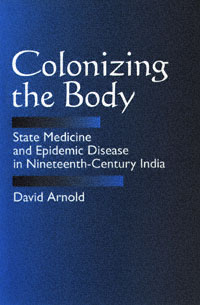 | Title: Colonizing the body: state medicine and epidemic disease in nineteenth-century India Author: Arnold, David 1946- Published: University of California Press, 1993 Subjects: Asian Studies | South Asia | Asian History | Medicine | History Publisher's Description: In this innovative analysis of medicine and disease in colonial India, David Arnold explores the vital role of the state in medical and public health activities, arguing that Western medicine became a critical battleground between the colonized and the colonizers.Focusing on three major epidemic diseases - smallpox, cholera, and plague - Arnold analyzes the impact of medical interventionism. He demonstrates that Western medicine as practiced in India was not simply transferred from West to East, but was also fashioned in response to local needs and Indian conditions.By emphasizing this colonial dimension of medicine, Arnold highlights the centrality of the body to political authority in British India and shows how medicine both influenced and articulated the intrinsic contradictions of colonial rule. [brief] Similar Items |
| 3. | 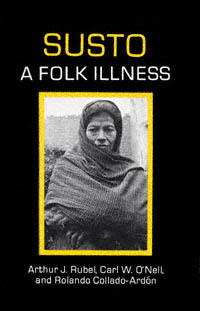 | Title: Susto, a folk illness Author: Rubel, Arthur J Published: University of California Press, 1984 Subjects: Anthropology | Medical Anthropology | Latin American Studies | Psychology Publisher's Description: Widespread throughout Latin America, susto is a folk illness associated with a broad array of symptoms. It is considered by susceptible populations to be a sickness caused by the separation of soul and body which is precipitated by a supernatural force. Most studies of culture-bound diseases have relied on descriptive approaches that focus on pathologies derived from medical textbooks. This study takes an interdisciplinary approach, looking for explanations of susto in the interaction of social, physiological, and psychological factors. [brief] Similar Items |
| 4. |  | Title: The flight of the mind: Virginia Woolf's art and manic-depressive illness Author: Caramagno, Thomas C Published: University of California Press, 1992 Subjects: Literature | English Literature | Autobiographies and Biographies | Women's Studies Publisher's Description: In this major new book on Virginia Woolf, Caramagno contends psychobiography has much to gain from a closer engagement with science. Literary studies of Woolf's life have been written almost exclusively from a psychoanalytic perspective. They portray Woolf as a victim of the Freudian "family romance," reducing her art to a neurotic evasion of a traumatic childhood.But current knowledge about manic-depressive illness - its genetic transmission, its biochemistry, and its effect on brain function - reveals a new relationship between Woolf's art and her illness. Caramagno demonstrates how Woolf used her illness intelligently and creatively in her theories of fiction, of mental functioning, and of self structure. Her novels dramatize her struggle to imagine and master psychic fragmentation. They helped her restore form and value to her own sense of self and lead her readers to an enriched appreciation of the complexity of human consciousness. [brief] Similar Items |
| 5. | 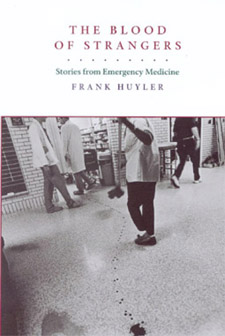 | Title: The blood of strangers: stories from emergency medicine Author: Huyler, Frank 1964- Published: University of California Press, 1999 Subjects: Medicine | American Literature | Autobiography Publisher's Description: Reminiscent of Chekhov's stories, The Blood of Strangers is a visceral portrayal of a physician's encounters with the highly charged world of an emergency room. In this collection of spare and elegant stories, Dr. Frank Huyler reveals a side of medicine where small moments - the intricacy of suturing a facial wound, the bath a patient receives from her husband and daughter - interweave with the lives and deaths of the desperately sick and injured. The author presents an array of fascinating characters, both patients and doctors - a neurosurgeon who practices witchcraft, a trauma surgeon who unexpectedly commits suicide, a wounded murderer, a man chased across the New Mexico desert by a heat-seeking missile. At times surreal, at times lyrical, at times brutal and terrifying, The Blood of Strangers is a literary work that emerges from one of the most dramatic specialties of modern medicine. This deeply affecting first book has been described by one early reader as "the best doctor collection I have seen since William Carlos Williams's The Doctor Stories ." [brief] Similar Items |
| 6. | 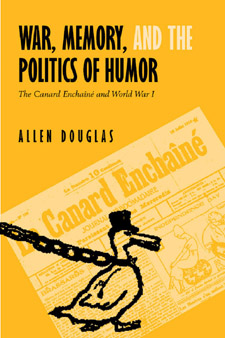 | Title: War, memory, and the politics of humor: the Canard enchaîné and World War I Author: Douglas, Allen 1949- Published: University of California Press, 2002 Subjects: History | French Studies | European History | European Literature | Print Media Publisher's Description: War, Memory, and the Politics of Humor features carnage and cannibalism, gender and cross-dressing, drunks and heroes, militarism and memory, all set against the background of World War I France. Allen Douglas shows how a new satiric weekly, the Canard Enchaîné, exploited these topics and others to become one of France's most influential voices of reaction to the Great War. The Canard, still published today, is France's leading satiric newspaper and the most successful periodical of the twentieth century, and Douglas colorfully illuminates the mechanisms of its unique style. Following the Canard from its birth in 1915 to the eve of the Great Depression, the narrative reveals a heady mix of word play, word games, and cartoons. Over the years the journal--generally leftist, specifically antimilitarist and anti-imperialist--aimed its shots in all directions, using some stereotypes the twenty-first century might find unacceptable. But Douglas calls its humor an affirmation of life, and as such the most effective antidote to war. [brief] Similar Items |
| 7. | 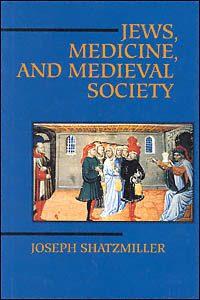 | Title: Jews, medicine, and medieval society Joseph Shatzmiller Author: Shatzmiller, Joseph Published: University of California Press, 1995 Subjects: Jewish Studies | Medieval History | European History | Medieval Studies | Medicine Publisher's Description: Jews were excluded from most professions in medieval, predominantly Christian Europe. Bigotry was widespread, yet Jews were accepted as doctors and surgeons, administering not only to other Jews but to Christians as well. Why did medieval Christians suspend their fear and suspicion of the Jews, allowing them to inspect their bodies, and even, at times, to determine their survival? What was the nature of the doctor-patient relationship? Did the law protect Jewish doctors in disputes over care and treatment?Joseph Shatzmiller explores these and other intriguing questions in the first full social history of the medieval Jewish doctor. Based on extensive archival research in Provence, Spain, and Italy, and a deep reading of the widely scattered literature, Shatzmiller examines the social and economic forces that allowed Jewish medical professionals to survive and thrive in thirteenth- and fourteenth-century Europe. His insights will prove fascinating to scholars and students of Judaica, medieval history, and the history of medicine. [brief] Similar Items |
| 8. | 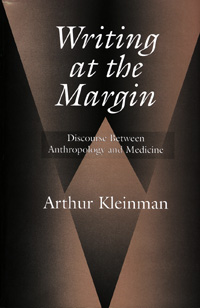 | Title: Writing at the margin: discourse between anthropology and medicine Author: Kleinman, Arthur Published: University of California Press, 1997 Subjects: Anthropology | Medical Anthropology | Sociology | Medicine | Asian Studies | Social Problems Publisher's Description: One of the most influential and creative scholars in medical anthropology takes stock of his recent intellectual odysseys in this collection of essays. Arthur Kleinman, an anthropologist and psychiatrist who has studied in Taiwan, China, and North America since 1968, draws upon his bicultural, multidisciplinary background to propose alternative strategies for thinking about how, in the postmodern world, the social and medical relate. Writing at the Margin explores the border between medical and social problems, the boundary between health and social change. Kleinman studies the body as the mediator between individual and collective experience, finding that many health problems - for example the trauma of violence or depression in the course of chronic pain - are less individual medical problems than interpersonal experiences of social suffering. He argues for an ethnographic approach to moral practice in medicine, one that embraces the infrapolitical context of illness, the responses to it, the social institutions relating to it, and the way it is configured in medical ethics.Previously published in various journals, these essays have been revised, updated, and brought together with an introduction, an essay on violence and the politics of post-traumatic stress disorder, and a new chapter that examines the contemporary ethnographic literature of medical anthropology. [brief] Similar Items |
| 9. | 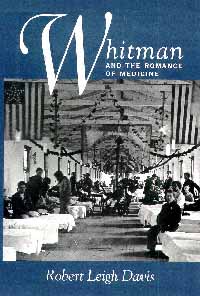 | Title: Whitman and the romance of medicine Author: Davis, Robert Leigh 1956- Published: University of California Press, 1997 Subjects: American Studies | American Literature | Gender Studies Publisher's Description: In this compelling, accessible examination of one of America's greatest cultural and literary figures, Robert Leigh Davis details the literary and social significance of Walt Whitman's career as a nurse during the American Civil War. Davis shows how the concept of "convalescence" in nineteenth-century medicine and philosophy - along with Whitman's personal war experiences - provide a crucial point of convergence for Whitman's work as a gay and democratic writer.In his analysis of Whitman's writings during this period - Drum-Taps, Democratic Vistas, Memoranda During the War , along with journalistic works and correspondence - Davis argues against the standard interpretation that Whitman's earliest work was his best. He finds instead that Whitman's hospital writings are his most persuasive account of the democratic experience. Deeply moved by the courage and dignity of common soldiers, Whitman came to identify the Civil War hospitals with the very essence of American democratic life, and his writing during this period includes some of his most urgent reflections on suffering, sympathy, violence, and love. Davis concludes this study with an essay on the contemporary medical writer Richard Selzer, who develops the implications of Whitman's ideas into a new theory of medical narrative. [brief] Similar Items |
| 10. | 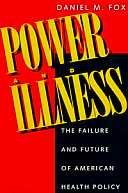 | Title: Power and illness: the failure and future of American health policy Author: Fox, Daniel M Published: University of California Press, 1993 Subjects: Sociology | Medicine | History | American Studies | United States History Publisher's Description: During most of this century, American health policy has emphasized caring for acute conditions rather than preventing and managing chronic illness - even though chronic illness has caused most sickness and death since the 1920s. In this provocative and wide-ranging book, Daniel Fox explains why this has been so and offers a forceful argument for fundamental change in national health care priorities.Fox discusses how ideas about illness and health care, as well as the power of special interest groups, have shaped the ways in which Americans have treated illness. Those who make health policy decisions have increased support for hospitals, physicians, and medical research, believing that people then would become healthier. This position, implemented at considerable cost, has not adequately taken into account the growing burden of chronic disabling illness. While decision makers may have defined chronic disease as a high priority in research, they have not given it such a priority in the financing of health services.The increasing burden of chronic illness is critical. Fox suggests ways to solve this problem without increasing the already high cost of health care - but he does not underestimate the difficulties in such a strategy. Advocating the redistribution of resources within hospital and medical services, he targets those that are redundant or marginally effective.There could be no more timely subject today than American health care. And Daniel Fox is uniquely able to address its problems. A historian of medicine, with knowledge of how hospitals and physicians behave and how health policy is made at government levels, he has extensively researched published and unpublished documents on health care. What he proposes could profoundly affect all Americans. [brief] Similar Items |
| 11. | 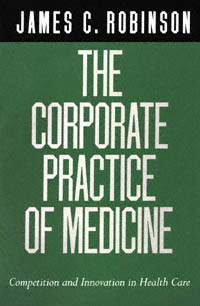 | Title: The corporate practice of medicine: competition and innovation in health care Author: Robinson, James C 1953- Published: University of California Press, 1999 Subjects: Politics | Public Policy | Medicine | Economics and Business Publisher's Description: One of the country's leading health economists presents a provocative analysis of the transformation of American medicine from a system of professional dominance to an industry under corporate control. James Robinson examines the economic and political forces that have eroded the traditional medical system of solo practice and fee-for-service insurance, hindered governmental regulation, and invited the market competition and organizational innovations that now are under way. The trend toward health care corporatization is irreversible, he says, and it parallels analogous trends toward privatization in the world economy.The physician is the key figure in health care, and how physicians are organized is central to the health care system, says Robinson. He focuses on four forms of physician organization to illustrate how external pressures have led to health care innovations: multispecialty medical groups, Independent Practice Associations (IPAs), physician practice management firms, and physician-hospital organizations. These physician organizations have evolved in the past two decades by adopting from the larger corporate sector similar forms of ownership, governance, finance, compensation, and marketing.In applying economic principles to the maelstrom of health care, Robinson highlights the similarities between competition and consolidation in medicine and in other sectors of the economy. He points to hidden costs in fee-for-service medicine - overtreatment, rampant inflation, uncritical professional dominance regarding treatment decisions - factors often overlooked when newer organizational models are criticized.Not everyone will share Robinson's appreciation for market competition and corporate organization in American health care, but he challenges those who would return to the inefficient and inequitable era of medicine from which we've just emerged. Forcefully written and thoroughly documented, The Corporate Practice of Medicine presents a thoughtful - and optimistic - view of a future health care system, one in which physician entrepreneurship is a dynamic component. [brief] Similar Items |
| 12. | 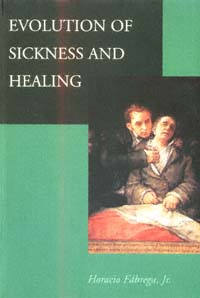 | Title: Evolution of sickness and healing Author: Fabrega, Horacio Published: University of California Press, 1997 Subjects: Medicine | Medical Anthropology Publisher's Description: Evolution of Sickness and Healing is a theoretical work on the grand scale, an original synthesis of many disciplines in social studies of medicine. Looking at human sickness and healing through the lens of evolutionary theory, Horacio Fàbrega, Jr. presents not only the vulnerability to disease and injury but also the need to show and communicate sickness and to seek and provide healing as innate biological traits grounded in evolution. This linking of sickness and healing, as inseparable facets of a unique human adaptation developed during the evolution of the hominid line, offers a new vantage point from which to examine the institution of medicine.To show how this complex, integrated adaptation for sickness and healing lies at the root of medicine, and how it is expressed culturally in relation to the changing historical contingencies of human societies, Fàbrega traces the characteristics of sickness and healing through the early and later stages of social evolution. Besides offering a new conceptual structure and a methodology for analyzing medicine in evolutionary terms, he shows the relevance of this approach and its implications for the social sciences and for medical policy. Health scientists and medical practitioners, along with medical historians, economists, anthropologists, and sociologists, now have the opportunity to consider every essential aspect of medicine within an integrated framework. [brief] Similar Items |
| 13. | 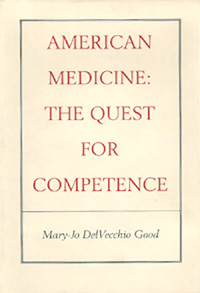 | Title: American medicine: the quest for competence Author: Good, Mary-Jo DelVecchio Published: University of California Press, 1995 Subjects: Medicine | Science | Medical Anthropology | Public Policy Publisher's Description: What does it mean to be a good doctor in America today? How do such challenges as new biotechnologies, the threat of malpractice suits, and proposed health-care reform affect physicians' ability to provide quality care?These and many other crucial questions are examined in this book, the first to fully explore the meaning and politics of competence in modern American medicine. Based on Mary-Jo DelVecchio Good's recent ethnographic studies of three distinct medical communities - physicians in rural California, academics and students involved in Harvard Medical School's innovative "New Pathway" curriculum, and oncologists working on breast cancer treatment - the book demonstrates the centrality of the issue of competence throughout the medical world. Competence, it shows, provides the framework for discussing the power struggles between rural general practitioners and specialists, organizational changes in medical education, and the clinical narratives of high-technology oncologists. In their own words, practitioners, students, and academics describe what competence means to them and reveal their frustration with medical-legal institutions, malpractice, and the limitations of peer review and medical training.Timely and provocative, this study is essential reading for medical professionals, academics, anthropologists, and sociologists, as well as health-care policymakers. [brief] Similar Items |
| 14. |  | Title: Taming the wind of desire: psychology, medicine, and aesthetics in Malay shamanistic performance Author: Laderman, Carol Published: University of California Press, 1991 Subjects: Anthropology | Asian Studies | Medical Anthropology | Psychology | Southeast Asia | Medicine Publisher's Description: Charged with restoring harmony and relieving pain, the Malay shaman places his patients in trance and encourages them to express their talents, drives, personality traits - the "Inner Winds" of Malay medical lore - in a kind of performance. These healing ceremonies, formerly viewed by Western anthropologists as exotic curiosities, actually reveal complex multicultural origins and a unique indigenous medical tradition whose psychological content is remarkably relevant to contemporary Western concerns.Accepted as apprentice to a Malay shaman, Carol Laderman learned and recorded every aspect of the healing seance and found it comparable in many ways to the traditional dramas of Southeast Asia and of other cultures such as ancient Greece, Japan, and India. The Malay seance is a total performance, complete with audience, stage, props, plot, music, and dance. The players include the patient along with the shaman and his troupe. At the center of the drama are pivotal relationships - among people, between humans and spirits, and within the self. The best of the Malay shamans are superb poets, dramatists, and performers as well as effective healers of body and soul. [brief] Similar Items |
| 15. | 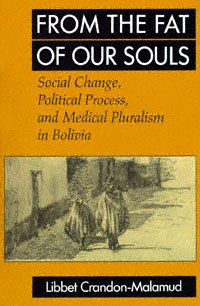 | Title: From the fat of our souls: social change, political process, and medical pluralism in Bolivia Author: Crandon-Malamud, Libbet Published: University of California Press, 1991 Subjects: Anthropology | Latin American Studies | Politics | Medical Anthropology | Medicine Publisher's Description: From the Fat of Our Souls offers a revealing new perspective on medicine, and the reasons for choosing or combining indigenous and cosmopolitan medical systems, in the Andean highlands. Closely observing the dialogue that surrounds medicine and medical care among Indians and Mestizos, Catholics and Protestants, peasants and professionals in the rural town of Kachitu, Libbet Crandon-Malamud finds that medical choice is based not on medical efficacy but on political concerns. Through the primary resource of medicine, people have access to secondary resources, the principal one being social mobility. This investigation of medical pluralism is also a history of class formation and the fluidity of both medical theory and social identity in highland Bolivia, and it is told through the often heartrending, often hilarious stories of the people who live there. [brief] Similar Items |
| 16. | 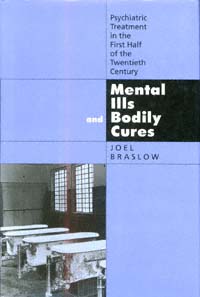 | Title: Mental ills and bodily cures: psychiatric treatment in the first half of the twentieth century Author: Braslow, Joel T 1959- Published: University of California Press, 1997 Subjects: Science | Psychiatry | Medicine | History and Philosophy of Science | Psychology Publisher's Description: Mental Ills and Bodily Cures depicts a time when psychiatric medicine went to lengths we now find extreme and perhaps even brutal ways to heal the mind by treating the body. From a treasure trove of California psychiatric hospital records, including many verbatim transcripts of patient interviews, Joel Braslow masterfully reconstructs the world of mental patients and their doctors in the first half of the twentieth century. Hydrotherapy, sterilization, electroshock, lobotomy, and clitoridectomy - these were among the drastic somatic treatments used in these hospitals.By allowing the would-be healers and those in psychological and physical distress to speak for themselves, Braslow captures the intense and emotional interplay surrounding these therapies. His investigation combines revealing clinical detail with the immediacy of "being there" in the institutional setting while decisions are made, procedures undertaken, and results observed by all those involved. We learn how well-intentioned physicians could rationalize and regard as therapeutic treatments that often had dreadful consequences, and how much the social and cultural world is inscribed within the practice of biological psychiatry. The book will interest historians of medicine, practicing psychiatrists, and everyone who knows or has seen what it's like to be in mental distress. [brief] Similar Items |
| 17. | 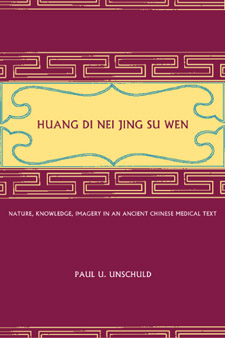 | Title: Huang Di nei jing su wen: nature, knowledge, imagery in an ancient Chinese medical text, with an appendix, The doctrine of the five periods and six qi in the Huang Di nei jing su wen Author: Unschuld, Paul U. (Paul Ulrich) 1943- Published: University of California Press, 2003 Subjects: Anthropology | Asian Studies | Medical Anthropology | China | History of Medicine Publisher's Description: The Huang Di nei jing su wen, known familiarly as the Su wen, is a seminal text of ancient Chinese medicine, yet until now there has been no comprehensive, detailed analysis of its development and contents. At last Paul U. Unschuld offers entry into this still-vital artifact of China's cultural and intellectual past. Unschuld traces the history of the Su wen to its origins in the final centuries B.C.E., when numerous authors wrote short medical essays to explain the foundations of human health and illness on the basis of the newly developed vessel theory. He examines the meaning of the title and the way the work has been received throughout Chinese medical history, both before and after the eleventh century when the text as it is known today emerged. Unschuld's survey of the contents includes illuminating discussions of the yin-yang and five-agents doctrines, the perception of the human body and its organs, qi and blood, pathogenic agents, concepts of disease and diagnosis, and a variety of therapies, including the new technique of acupuncture. An extensive appendix, furthermore, offers a detailed introduction to the complicated climatological theories of Wu yun liu qi ("five periods and six qi"), which were added to the Su wen by Wang Bing in the Tang era. In an epilogue, Unschuld writes about the break with tradition and innovative style of thought represented by the Su wen. For the first time, health care took the form of "medicine," in that it focused on environmental conditions, climatic agents, and behavior as causal in the emergence of disease and on the importance of natural laws in explaining illness. Unschuld points out that much of what we surmise about the human organism is simply a projection, reflecting dominant values and social goals, and he constructs a hypothesis to explain the formation and acceptance of basic notions of health and disease in a given society. Reading the Su wen, he says, not only offers a better understanding of the roots of Chinese medicine as an integrated aspect of Chinese civilization; it also provides a much needed starting point for discussions of the differences and parallels between European and Chinese ways of dealing with illness and the risk of early death. [brief] Similar Items |
| 18. | 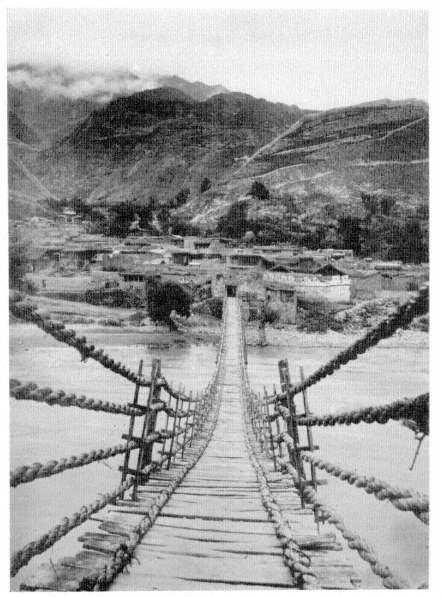 | Title: Golden inches: the China memoir of Grace Service Author: Service, Grace 1879-1954 Published: University of California Press, 1991 Subjects: History | Autobiographies and Biographies | Christianity | Asian History | China Similar Items |
| 19. | 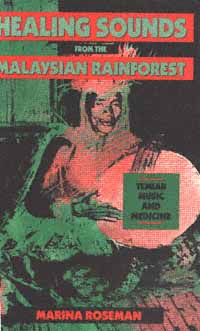 | Title: Healing sounds from the Malaysian rainforest: Temiar music and medicine Author: Roseman, Marina 1952- Published: University of California Press, 1991 Subjects: Anthropology | Medical Anthropology | East Asia Other | Ethnomusicology | Asian Studies | Cultural Anthropology | Medicine | Musicology Publisher's Description: Music and dance play a central role in the "healing arts" of the Senoi Temiar, a group of hunters and horticulturalists dwelling in the rainforest of peninsular Malaysia. As musicologist and anthropologist, Marina Roseman recorded and transcribed Temiar rituals, while as a member of the community she became a participant and even a patient during the course of her two-year stay. She shows how the sounds and gestures of music and dance acquire a potency that can transform thoughts, emotions, and bodies. [brief] Similar Items |
| 20. | 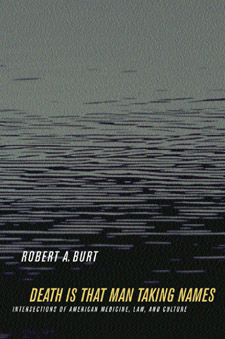 | Title: Death is that man taking names: intersections of American medicine, law, and culture Author: Burt, Robert 1939- Published: University of California Press, 2002 Subjects: Law | Health Care | History of Medicine | Ethics | Religion Publisher's Description: The American culture of death changed radically in the 1970s. For terminal illnesses, hidden decisions by physicians were rejected in favor of rational self-control by patients asserting their "right to die" - initially by refusing medical treatment and more recently by physician-assisted suicide. This new claim rested on two seemingly irrefutable propositions: first, that death can be a positive good for individuals whose suffering has become intolerable; and second, that death is an inevitable and therefore morally neutral biological event. Death Is That Man Taking Names suggests, however, that a contrary attitude persists in our culture - that death is inherently evil, not just in practical but also in moral terms. The new ethos of rational self-control cannot refute but can only unsuccessfully try to suppress this contrary attitude. The inevitable failure of this suppressive effort provokes ambivalence and clouds rational judgment in many people's minds and paradoxically leads to inflictions of terrible suffering on terminally ill people. Judicial reforms in the 1970s of abortion and capital punishment were driven by similarly high valuations of rationality and public decision-making - rejecting physician control over abortion in favor of individual self-control by pregnant women and subjecting unsupervised jury decisions for capital punishment to supposed rationally guided supervision by judges. These reforms also attempt to suppress persistently ambivalent attitudes toward death, and are therefore prone to inflicting unjustified suffering on pregnant women and death-sentenced prisoners. In this profound and subtle account of psychological and social forces underlying American cultural attitudes toward death, Robert A. Burt maintains that unacknowledged ambivalence is likely to undermine the beneficent goals of post-1970s reforms and harm the very people these changes were intended to help. [brief] Similar Items |